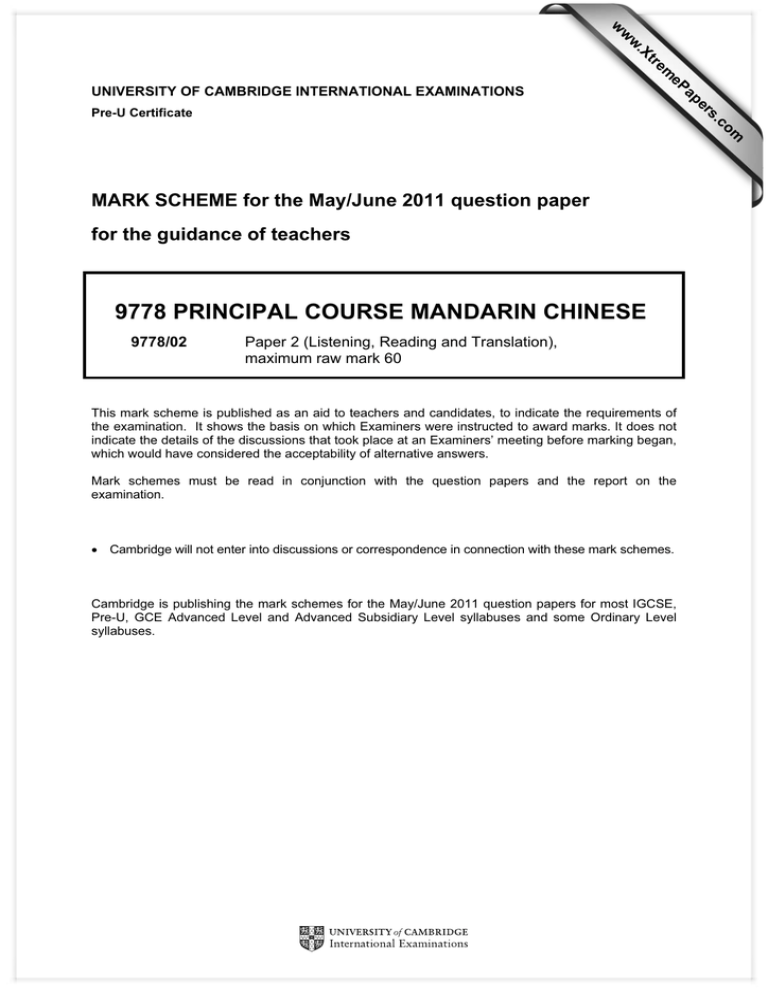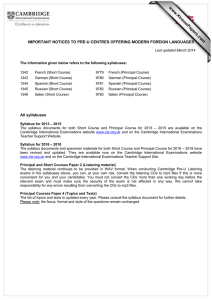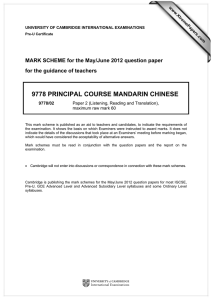9778 PRINCIPAL COURSE MANDARIN CHINESE for the guidance of teachers
advertisement

w w ap eP m e tr .X w UNIVERSITY OF CAMBRIDGE INTERNATIONAL EXAMINATIONS s er om .c Pre-U Certificate MARK SCHEME for the May/June 2011 question paper for the guidance of teachers 9778 PRINCIPAL COURSE MANDARIN CHINESE 9778/02 Paper 2 (Listening, Reading and Translation), maximum raw mark 60 This mark scheme is published as an aid to teachers and candidates, to indicate the requirements of the examination. It shows the basis on which Examiners were instructed to award marks. It does not indicate the details of the discussions that took place at an Examiners’ meeting before marking began, which would have considered the acceptability of alternative answers. Mark schemes must be read in conjunction with the question papers and the report on the examination. • Cambridge will not enter into discussions or correspondence in connection with these mark schemes. Cambridge is publishing the mark schemes for the May/June 2011 question papers for most IGCSE, Pre-U, GCE Advanced Level and Advanced Subsidiary Level syllabuses and some Ordinary Level syllabuses. Page 2 Mark Scheme: Teachers’ version Pre-U – May/June 2011 Syllabus 9778 Paper 02 SECTION 1: LISTENING Exercise 1 Questions 1–3 1 xiāng cūn 乡村 [1] 2 quán bù 全部 [1] 3 jì zhě 记者 [1] Exercise 2 Questions 4–6 4 C [1] 5 A [1] 6 B [1] Exercise 3 Questions 7-10 7 fashionable/popular [1] 8 (i) relaxed [1] (ii) reduced travel expenses/economical [1] (i) to confirm/choose/decide the travel destination (prior to departure) [1] (ii) to understand the transportation/traffic arrangements/situation [1] 9 10 (i) take the minimum necessary cash (ii) avoid keeping all cash in the same place © University of Cambridge International Examinations 2011 [1] [1] Page 3 Mark Scheme: Teachers’ version Pre-U – May/June 2011 Syllabus 9778 Paper 02 Exercise 4 Question 11 11 Changes to Chinese cities the urban population is increasing cities are continually expanding previously, Chinese cities had their own characters regardless of their size now, every city has skyscrapers and a city centre square/they all look similar cultural diversity is slowly reducing. ‘city illnesses’ super fast pace of life living pressure traffic jams/crowded transport expensive properties noise pollution… Urban planning should consider the local natural environment should keep the local traditional culture [7] [Total marks for Section 1: 20] SECTION 2: READING Exercise 1 Question 12 12 (a) living standards [1] (b) only children [1] (c) indulgence [1] (d) health and nutrition [1] Exercise 2 Questions 13–16 13 that obesity is caused by eating too much 14 Any two of: distribute nutrition evenly across every meal pay special attention to breakfast eat more fruit and vegetables [1] [1+1] 15 they spend their time on (school-)work and internet-surfing [1] 16 children should guarantee a minimum of 1 hour’s sports every day [1] © University of Cambridge International Examinations 2011 Page 4 Mark Scheme: Teachers’ version Pre-U – May/June 2011 Syllabus 9778 Paper 02 Exercise 3 Questions 17–20 17 (a) an educated work force [1] 18 (a) culture [1] 19 (b) independence [1] 20 (c) examination marks [1] Exercise 4 Questions 21-22 21 not allowing the children to do any housework they meet all their child’s financial demands [1] [1] 22 Any three of: lack the ability to live independently lack social skills lack ability to bear hardship they don’t care about older generations do not feel a great deal of responsibility (towards wider society) encouraged to spend excessively [1+1+1] [Total marks for Section 2: 18] SECTION 3: CHINESE SAYINGS Exercise 1 Question 23 6 marks will be available in total: 1 x 3 marks for the literal translations and 1 x 3 marks for the explanations in English. (a) (i) fox assuming tiger’s ferocity [1] (ii) to bully people by flaunting one’s powerful connections [1] (b) (i) combat poison with poison [1] (ii) fight fire with fire [1] (c) (i) the over-confident army will lose the battle for sure [1] (ii) pride comes before a fall [1] [Total marks for Section 3: 6] © University of Cambridge International Examinations 2011 Page 5 Mark Scheme: Teachers’ version Pre-U – May/June 2011 Syllabus 9778 Paper 02 SECTION 4: TRANSLATION Let ‘environmental protection’ enter our lives Humanity has only one home where it can live – the Earth./Water and air pollution/and heaped up rubbish/are threatening our home./ As inhabitants of Earth,/we cannot simply worry;/instead we must act fast./We ought to choose a lifestyle that is beneficial to the environment/ – economizing resources,/encouraging green consumption,/recycling/and reusing./ ‘Green living’ is a message, it encourages enterprise to develop green technology;/‘Green living’ is a requirement,/it requires the politicians to actively promote environmental protection policies;/‘Green living’ is a pledge,/it reminds the people from this generation/ to protect the next generation’s right to exist./ [Total marks for Section 4: 16] © University of Cambridge International Examinations 2011 Page 6 Mark Scheme: Teachers’ version Pre-U – May/June 2011 Syllabus 9778 Paper 02 TAPESCRIPT E University of Cambridge International Examinations. Pre-U Mandarin Chinese Principal Course 9778 Paper 2, June 2011 Examination. Section 1, Listening. INSTRUCTIONS TO CANDIDATES Write your Centre number, candidate number and name on all the work you hand in. Write in dark blue or black pen. Do not use staples, paper clips, highlighters, glue or correction fluid. Do not write in any Barcodes. Answer all the questions in the spaces provided. There are instructions about how to answer the questions, and which language to answer in, above each item on the question paper. You need not write in full sentences in responses to Listening Text (d). You are reminded to write your response to Listening Text (e) in continuous English prose. You may listen to the passages as many times as you wish on your individual listening equipment. You may make notes and write your answers at any time during the test. You are advised to spend 30 minutes on this section. The number of marks is given in brackets at the end of each question or part question. (Pause 5 seconds) (signal) E Exercise 1. Listening Text (a). E Question 1 F (xiāng cūn) 乡村 E Question 2 F (quán bù) 全部 E Question 3 F (jì zhě) 记者 (Pause 3 seconds) © University of Cambridge International Examinations 2011 Page 7 Mark Scheme: Teachers’ version Pre-U – May/June 2011 E Exercise 2: a day out. E Listening Text (b). Syllabus 9778 Paper 02 上个星期六, 我和几个朋友坐公共汽车去城外的郊区。 (Pause 3 seconds) E Listening Text (c). 我们带着午餐和一些书准备在那儿复习,但是我们一直在讨论关于这周的足球比赛。 (Pause 3 seconds) E Exercise 3. Listening Text (d). 自助旅游是近年来国际上流行的一种旅游形式。自助旅游满足了人们外出旅游“轻松” 和“多样”的需要;同时大大降低了旅行费用,让旅行者在经济上得到实惠。 旅行者在出发前要注意: 一.确定旅游目的地 二.了解交通情况 另外,在旅行中旅行者身上应该少带现金,而且不要把全部现金放在同一个地方。 (Pause 3 seconds) E Exercise 4. Listening Text (e). 中国城市化 随着中国经济的快速发展,城市人口不断增加,城市一直在扩大。 以前,中国的城市,不论大小都很有特色。可是现在,在任何城市都有高楼大厦、中心广场, 所有的城市看起来都差不多。中国城市文化的多样性正在慢慢减少。 同时,各种各样的城市病出现了:生活速度过快、人们压力太大、交通拥挤、住房贵,噪音……。 城市计划应该根据各个地方的自然环境,保留本地的传统文化。 (Pause 3 seconds) E This is the end of the recorded material. © University of Cambridge International Examinations 2011

